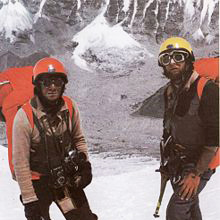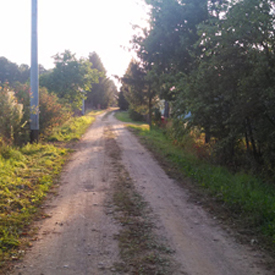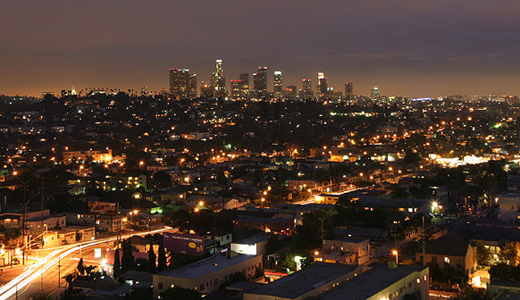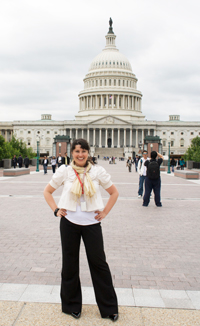
In front of the Capitol; May 19, 2010
I spent the fourth and final quarter of my graduate journalism program in Medill’s Washington DC newsroom. Here’s a few highlights from my 12-week adventure in the U.S. capital.
An empty stage. Dark.
Lights on, illuminating an elaborate backdrop: abstract sketches of Capitol Hill, the White House, the Smithsonian Castle and government buildings interspersed with oversized drawings of notebooks, pens, pencils, cameras, video equipment, headphones, microphones, laptops.
Cue music: “Washington DC” by the Magnetic Fields
Enter stage left: Novice reporter. Business suit, large press pass on a red lanyard around her neck. Overstuffed backpack; notebook + audio recorder in left hand; pen + camera in right hand.
Spotlight on reporter, who crosses to center stage. She takes off the backpack, puts down her equipment.
Music fades.
As reporter delivers the following series of short monologues, various bits of the backdrop are lit to correspond with each monologue’s content.
***
Sigourney + me
The Russell Senate Office Building sits across from the Hill. It’s very stately, especially the Rotunda, where I’m scheduled to interview actress Sigourney Weaver. She’s in town to talk about the environment, and I’m here to interview her about her talking about the environment.
Cameras are set up all around the Rotunda. I find and chat with Sigourney’s press liaison, then with another reporter. I listen in on the interviews Sigourney gives to other stations and reporters.
It’s a brilliantly sunny day. The Rotunda is all white marble; everything is gleaming and looks crisp and fresh. I’m the last reporter to interview Sigourney. She shakes my hand delicately – and says, “I love your necklace.” I’m wearing a colorful beaded necklace from Rome. She’s wearing a bright blue dress with a bright orange sweater. I say, “Thank you – I love your colors!” She says it’s the only thing she has left that’s clean ‘cause she just flew in from Brazil. I say, “How was that?” And we’re off.
She’s articulate and smart, thoughtful and chooses her words carefully. I ask her about the carbon footprint of movies. We talk about public awareness. I also say, these are issues you’re obviously passionate about. And that’s it!
It’s been about five minutes, and we shake hands again. We walk over to her press liaison. It’s very calm and still and quiet; the rest of the reporters have taken off. I shake hands with the two other members of her entourage, tell them all: “Have a great rest of your day! It’s beautiful out there.”
Sig says, “Thanks for doing the piece.”
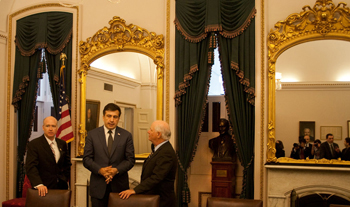
Georgian President M. Saakhashvili meets with members of the U.S. Helsinki Commission – but not me – on Capitol Hill; April 14, 2010
Saakhashvili but not me
The Georgian president is scheduled to meet with members of the U.S. Helsinki Commission, and yours truly thinks this will make a nice daily story. Saakhashvili is supposed to have press availability afterward, so I load up my gear + equipment and head for the Hill.
The thing about reporting on the Hill is that there are long moments of waiting and standing around on marble floors, half-admiring the gorgeous architecture, friezes, paintings, and half-watching and waiting to see if the person you’re waiting for is on their way.
A burst of activity, then Saakhashvili walks by and into the meeting room. We’re allowed to follow him in for a photo opportunity. Once in, I can’t get a good angle until someone pulls my arm and says, try here.
Then we’re ushered out. And we wait. And watch. And chitchat.
Then a senator comes out and says that although Saakhashvili won’t be taking press questions, he, the senator, can answer a few. He talks a bit about the U.S. relationship with Georgia, then asks if anyone has questions. He looks at me.
I blank. I freeze. I have questions for Saakhashvili. I have none for the senator. And there are no other reporters there – just cameramen and photographers, who don’t ask questions.
I ask the senator if they discussed Georgian NATO membership. He says no. And then there’s an awkward, horrible silence, because I cannot think of another question. The senator leaves. I unfreeze, and try to breathe because this must happens to every newbie Hill reporter, right? Did you discuss NATO? Did you discuss NATO? spins around my head like a broken record.
I sweep the remaining shards of my dignity up into my backpack and exit the Capitol. Walking toward the Metro, I see a swarm of Secret Service in sunglasses, and one of the thick-necked Georgian service men I saw with Saakhashvili earlier. They’re all striding down the street quickly, Saakhashvili in the middle. He’s quite tall; I want to yell at him for not taking press questions but console myself by glowering at him from the side of the sidewalk as he sweeps by.
I listen to the audio recording of the senator speaking about Georgia when I get back to the newsroom. And see places where I could’ve followed up, asked questions, had I truly been listening to what the senator was saying. It’s a humbling experience.
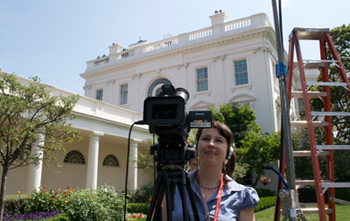
Setting up for the president’s statement on the BP oil spill in the White House Rose Garden; June 1, 2010.
Obama + me + many others
We’re both from Chicago; he is, of course, the most powerful man in the world while I am but a fledgling reporter who still gets a wee bit nervous sometimes at press conferences (NATO membership, anyone?).
But no trip to DC would be complete without visiting him, so a fellow reporter and I find a presidential event to cover, get ourselves on the White House press list and set off.
It’s hot and humid, the kind of heat where you melt and your clothes wrinkle the second you step foot out the door. We are carrying backpacks and a video camera and tripod. They are heavy. But we are excited.
We pass through White House security, are issued special passes, make our way to the White House Rose Garden. We are giddy. Around us, veteran cameramen are calmly setting up, untangling cables, checking sound. Secret Service is all around, half-hidden in the garden and trees, silent, in sunglasses, very still.
John and I keep looking at each other and saying, I can’t believe I’m here! I, in the guise of checking my camera’s white balance, keep taking pictures of John and asking him to take pictures of me.
When the president comes out, it’s the first time I’ve ever seen him in person. I’m momentarily stunned, so that all I can think is: it’s him, it’s him, it’s him – and I am not paying a bit of attention to what he’s saying. So I concentrate, and focus, and take notes, and think about how I’m going to write this piece. The president doesn’t take questions after his statement. I watch him walk away and hold the door open for two of the gentlemen who accompanied him as he spoke.
Afterward, John tells me he had the same reaction. We giggle some more, exchange notes. We take more photos in front of the White House on our way out; the guards watch us, stone-faced. We surrender our special White House press passes, then walk back to the newsroom.
Katyń
“Polish President, 89 others killed”
I read the words again.
There’s a link in the email; I click it. I fly through the article, half-understanding the words. I read it again, then look for other reports. They all say the same: Fatal plane crash; Smolensk; Lech Kaczyński and Ryszard Kaczorowski and Anna Walentynowicz and others – gone.
The plane was flying to the Katyń forest, near Smolensk, Russia for a ceremony honoring the Polish victims of the Katyń massacre: the 22,000 Polish officers, prisoners-of-war, murdered by Soviet secret police in 1940.
This was to be the second commemoration at Katyń that week: On Wednesday, the Polish and Russian prime ministers had met in the Katyń forest, along with numerous dignitaries and families of victims.
I wrote about this meeting that Wednesday. A few days earlier, as I’d discussed the article with one of my professors, I’d asked him, “Have you heard about Katyń?” No. A brilliant, seasoned investigative reporter. No.
The plane crash threw Katyń onto the front pages of newspapers and websites across the world.
I sat for hours that Saturday morning , clicking on article after article, in English, in Polish – anything I could find. My parents called; my father’s voice serious, urgent. I kept clicking, reading, huddled over my laptop. My mother called; the list of passengers had been released. Wojciech Seweryn – a Chicago artist whose father was one of the officers murdered in Katyń – was on it. My parents knew him; much of Chicago’s Polish community did.
A few days later, my mother sent me a link to a beautiful Russian ballad: “Greetings, Poland!” Alexander Dolsky’s mellow voice sings. “I’ve been dreaming about our meeting for years.” He sings on, about Mickiewicz, and Chopin, and about how Poland and Russia have been moving toward each other for years.
Have we? And will we continue to do so? Because Katyń was but one of an improbably long list of tragedies, murders, lies, deceits and betrayals.
There’s so much still about it that remains unknown. Russian archives still hold secrets. And there’s never been an apology for Katyń.
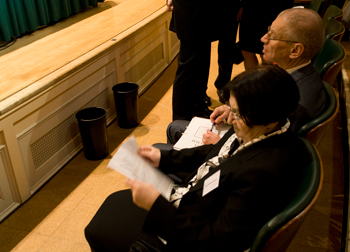
Russian Katyń scholars Natalya Lebedeva and Alexander Guryanov in the Library of Congress; May 5, 2010
A conference on Katyń was held May 5 at the Library of Congress. Weeks before, I began researching and interviewing in preparation for a series of articles about the conference – and Katyń. Scholars, professors, policy advisors, politicians, journalists – each had a different piece of the tale to tell.
On the day of the conference, I sat in the second row during the morning session with historian Anna Cienciala. We listened to Russian, then Polish Katyń scholars and experts speak about their work. Listening to Katyń being discussed in Russian felt monumental, historic.
The next day, the only reports in U.S. media on the conference were mine. Polish media reports were extensive; one even mentioned the lack of U.S. coverage. I thought: What if I hadn’t been there? Why aren’t more people writing about this? Why don’t more people care? And all I could think of was that it is up to us, those who do care, to make others feel at least a bit of the tremendous sorrow and pain that we carry about this momentous loss.
Epilogue
I’ve been done with school for a little over a week now. A year ago – I had no idea what to expect from graduate journalism school. I knew that afterward, my life would be very different. I knew I’d have a new career and a new set of skills. But the experiences – I didn’t know how amazing and profound and humbling and challenging and wondrous they’d be.
So what’s next? I’ve been asked in the past week. I don’t know yet – I’m interviewing for jobs, sending out my resume and clips. Yesterday, I took a long walk and finally realized that school was really over. I’m ready to move on – I’m ready to work again, I’m ready for a new set of experiences.
What’s next? We’ll see.
***
Reporter takes off her press pass and puts it in her backpack. She puts the backpack on, picks up all her equipment and exits stage right.
CR

